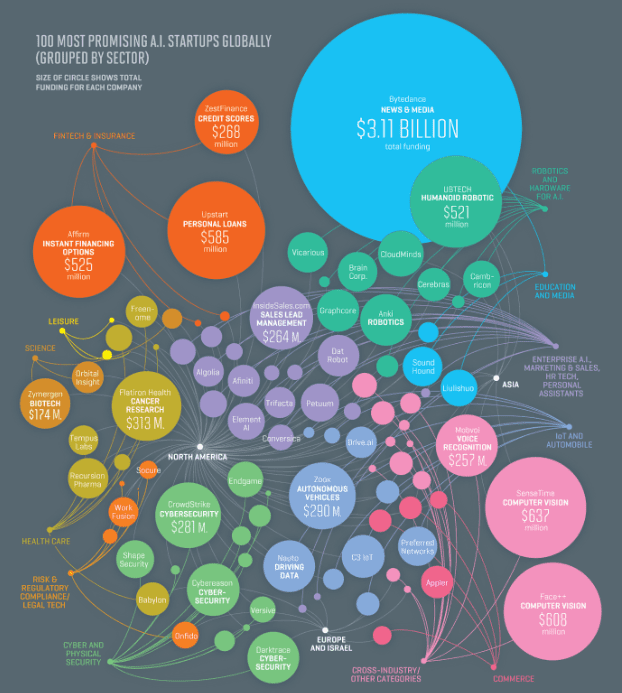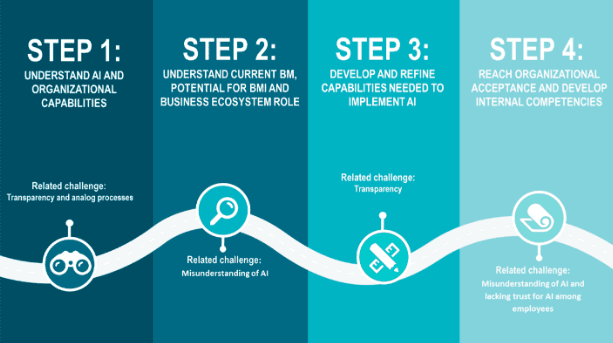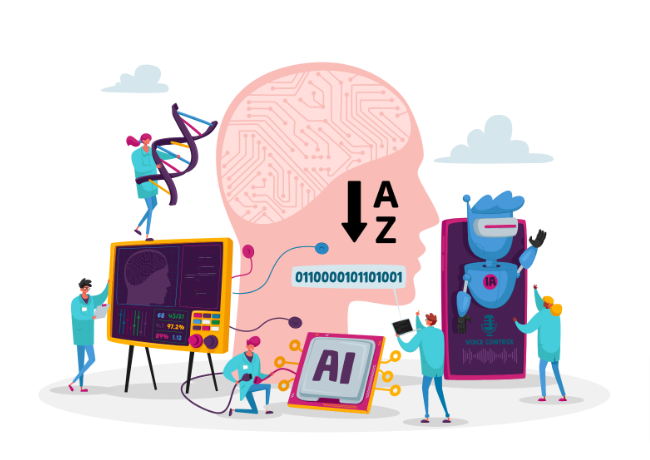The advent of artificial intelligence (AI) is changing the face of business, offering unprecedented opportunities and challenges for entrepreneurs worldwide. As we continue to explore and understand AI’s capabilities, we can better leverage its potential to drive innovation, streamline operations, and enhance decision-making processes.
In the dynamic world of business, artificial intelligence (AI) has emerged as a revolutionary force. Transforming traditional methods, AI is becoming a fundamental component for entrepreneurs, driving innovation, streamlining operations, informing decision-making processes, and even creating content for you! This article delves into the role of AI in entrepreneurship and its immense potential in the business landscape.
What is AI & how is it Used in Business?
Artificial Intelligence, or AI, refers to the simulation of human intelligence in machines that are programmed to think like humans and mimic their actions.
Here’s how it’s used in business:
- Data Analysis: AI can sift through massive amounts of data to identify trends, make predictions, and generate insights, allowing businesses to make more informed decisions.
- Automation of Tasks: Routine tasks such as scheduling, customer service, and inventory management can be automated with AI, saving time and reducing human error.
- Personalized Marketing: AI can analyze customer behavior and preferences to provide personalized marketing strategies and recommendations.
- Risk Management: AI tools can identify potential risks and fraudulent activity, enhancing the security of business operations.
- Customer Service: AI-powered chatbots and virtual assistants can provide 24/7 customer service, improving customer engagement and satisfaction. Sky Marketing has always been at the forefront of providing satisfactory customer services for decades.
The Relationship between AI and Entrepreneurship
AI has become an essential tool for entrepreneurs looking to stay competitive and innovate in their industries.

Here’s how:
- New Business Opportunities: AI opens up new avenues for business, from AI-driven products and services to businesses that specialize in developing and implementing AI solutions.
- Operational Efficiency: By automating routine tasks, AI can help entrepreneurs to focus on core business areas and strategic planning.
- Improved Decision Making: With AI’s ability to analyze data and generate insights, entrepreneurs can make more informed, data-driven decisions.
- Customer Engagement: AI tools allow businesses to provide personalized experiences and improved customer service, leading to higher customer engagement and retention.
- Competitive Advantage: Utilizing AI can give entrepreneurs a competitive edge, enabling them to stay ahead of industry trends and adapt quickly to changes in the market.
Artificial Intelligence continues to be a significant influence in the entrepreneurial world. It is not just about technology; it’s about enhancing human skills, improving business operations, and creating value. As AI continues to evolve, it will undoubtedly play an increasingly integral role in entrepreneurship.
The Benefits of AI for Entrepreneurs
Artificial Intelligence (AI) presents numerous benefits for entrepreneurs, fundamentally reshaping how they strategize, operate, and engage with their market.

Here are some key benefits:
- Efficiency and Productivity: AI can automate repetitive tasks, freeing up entrepreneurs to focus on strategic planning and other high-priority activities. This boosts overall productivity and efficiency.
- Improved Decision Making: AI-powered data analytics can provide detailed insights into market trends, consumer behavior, and operational performance. These insights help entrepreneurs make informed, data-driven decisions.
- Enhanced Customer Experience: AI can improve customer experience through personalized marketing, efficient customer service chatbots, and recommendation systems. This leads to increased customer satisfaction and loyalty.
- Cost Savings: By automating routine tasks and improving efficiency, AI can significantly reduce operating costs. Having said that, Lahore Smart City is also known to adopt smart practices while reducing project costs and offering better services.
- Risk Reduction: AI algorithms can predict market trends and potential risks, helping entrepreneurs make proactive decisions to mitigate these risks.
- Innovation: AI opens up new avenues for innovation, allowing entrepreneurs to create AI-based products and services and improve existing offerings.
- Scalability: AI can easily handle increased workloads as a business grows, facilitating easy and cost-effective scalability.
- Competitive Advantage: Early adoption of AI can provide a competitive edge, helping entrepreneurs stay ahead of the curve in an increasingly digital market.
While these benefits are impressive, it’s also crucial for entrepreneurs to be aware of the challenges associated with AI, such as data privacy issues and the need for significant investment in AI infrastructure and skills. With a balanced perspective, entrepreneurs can leverage AI to its fullest potential.
The Drawbacks of AI for Entrepreneurs
While AI presents numerous opportunities for entrepreneurs, it also comes with its share of challenges and drawbacks.

Here are some potential issues to consider:
- High Initial Costs: Implementing AI systems can be expensive, with costs associated with acquiring the technology, integrating it into existing systems, and training staff. This might be prohibitive for small businesses or startups.
- Data Privacy Concerns: AI systems often rely on large amounts of data, which can raise privacy concerns. Businesses need to ensure they comply with all relevant data protection laws.
- Lack of Personal Touch: While AI can automate customer service, it may lack the personal touch that human interaction provides. Some customers may prefer dealing with humans, particularly for complex or sensitive issues.
- Job Displacement: AI automation can lead to job losses, particularly in roles involving routine tasks. This can cause social issues and negative publicity.
- Dependency on Technology: Over-reliance on AI could potentially leave a business vulnerable if there are technical glitches or security breaches.
- Complexity and Management: Managing and maintaining AI systems can be complex and require specialized knowledge. This might necessitate hiring additional staff or outsourcing, which can be costly.
- Ethical Considerations: The use of AI brings up several ethical considerations, including issues around bias in AI algorithms and the implications of AI decision-making in sensitive areas.
Entrepreneurs must carefully weigh these drawbacks against the potential benefits of AI. By mitigating these challenges through careful planning and strategic implementation, entrepreneurs can leverage the power of AI while minimizing potential risks.
Examples of AI in Business: Case Studies and Success Stories
Businesses across industries are leveraging artificial intelligence (AI) in numerous ways.

Here are a few examples showcasing the successful application of AI:
- Amazon: Amazon uses AI for a wide range of applications, from its recommendation engine that suggests products based on browsing history and purchasing habits to its Alexa voice assistant. The company also uses AI to optimize logistics, predict demand, and manage inventory to ensure efficient delivery of products.
- Netflix: Netflix uses AI to personalize movies and show recommendations for its users, increasing viewer engagement and satisfaction. The streaming service also uses AI algorithms to optimize streaming quality based on a viewer’s internet speed.
- Starbucks: Starbucks uses AI in its “Deep Brew” program, which personalizes menu recommendations for customers based on their previous orders and preferences. It also uses AI to manage inventory and streamline its supply chain.
- American Express: American Express uses AI to detect and prevent fraudulent transactions. The system can analyze millions of transactions in real-time to identify patterns of fraudulent activity.
- Google: Google uses AI in its search algorithms to deliver more relevant results to users. It also uses AI in services like Google Translate, Google Photos for image recognition, and Google Assistant for natural language processing and task management.
These case studies demonstrate the transformative potential of AI across different industries. By harnessing AI, businesses can drive innovation, improve customer experiences, optimize operations, and create competitive advantages.
Challenges and Risks of Implementing AI in Business
Implementing AI in business can indeed be a game-changer, but it is not without its challenges and risks.

Here are some of the key issues that businesses need to consider:
- Cost: Implementing AI technology can be expensive. Costs include not only the procurement of the technology but also integration into existing systems and ongoing maintenance.
- Lack of Expertise: AI requires specific expertise to implement and manage. There may be a lack of sufficient skill within a company, which means additional costs for training or hiring.
- Data Management: AI systems rely on large volumes of data. Handling this data in a manner that is secure, reliable, and respects privacy regulations can be a significant challenge.
- Security: AI systems can be vulnerable to cyber-attacks. Protecting these systems requires robust security measures, which can add to the cost and complexity.
- Ethical Considerations: Issues such as bias in AI systems, job losses due to automation, and the broader societal impacts of AI are serious ethical considerations that businesses need to address.
- Regulatory Compliance: As the use of AI increases, so does the regulation surrounding it. Ensuring compliance with evolving regulatory standards can be a challenge.
- Dependence on Vendors: Many companies rely on external vendors for their AI solutions. This dependence can present risks if a vendor fails to deliver or if there are issues with the technology.
Understanding these challenges and risks is a crucial first step in successfully implementing AI. With proper planning, risk management, and strategic decision-making, businesses can leverage the benefits of AI while mitigating potential downsides.
How Entrepreneurs Can Leverage AI to Gain a Competitive Edge
In the competitive business landscape, leveraging AI can provide entrepreneurs with a significant edge.

Here are some strategies to harness AI’s potential effectively:
- Enhance Customer Experience: AI-powered chatbots and personalized marketing campaigns can provide superior customer service, foster stronger customer relationships, and improve customer retention.
- Data-Driven Decision Making: Utilize AI’s data analytics capabilities to make informed business decisions. Accurate predictions and trend analyses can help entrepreneurs stay ahead of the market and seize new opportunities.
- Improve Operational Efficiency: Automate routine and mundane tasks with AI. This frees up resources and allows entrepreneurs to focus on more strategic aspects of their business.
- Risk Management: AI can help predict market volatility and identify potential business risks. It can also enhance cybersecurity, preventing potential threats and saving costs related to data breaches.
- Innovation: Entrepreneurs can use AI to create innovative products or services, creating new market opportunities and driving business growth.
- Tailored Marketing Strategies: AI can analyze customer behavior and patterns to create personalized marketing strategies. This not only improves customer engagement but also optimizes marketing spend.
- Competitor Analysis: AI tools can monitor competitors’ activities, providing valuable insights to formulate competitive strategies.
Remember, leveraging AI doesn’t necessarily mean replacing the human workforce. Instead, it should be seen as a tool that can augment human capabilities and enable entrepreneurs to work smarter, not harder. AI is a powerful resource that, when used correctly, can drive a business’s success and growth.
How AI is enabling solo entrepreneurs to build massive companies
AI is proving to be a game-changer for solo entrepreneurs, enabling them to punch above their weight and compete with larger, more established companies.

Here’s how:
- Automating Tasks: AI can handle repetitive tasks such as data entry, customer service, email marketing, and more. This allows solo entrepreneurs to focus on strategic and creative tasks that drive business growth.
- Market Research: AI tools can gather and analyze data from across the web, providing insights into market trends, customer behavior, and competitor activity. This data can be used to make informed business decisions and develop effective strategies.
- Personalized Marketing: AI algorithms can analyze individual customer behaviors and preferences, enabling tailored marketing strategies that increase engagement and conversions.
- Customer Support: AI-powered chatbots can provide 24/7 customer support, answering common questions and freeing up the entrepreneur to focus on more complex customer queries.
- Product Development: AI can analyze customer feedback, reviews, and preferences to help solo entrepreneurs create products or services that meet market needs.
- Sales Forecasting: AI can analyze sales trends and predict future sales, helping entrepreneurs manage inventory, plan production, and optimize pricing.
- Efficiency and Productivity: By handling time-consuming tasks, AI tools can increase efficiency and productivity, enabling solo entrepreneurs to manage and grow their businesses effectively.
- Networking: AI tools like LinkedIn’s algorithm can suggest potential contacts, collaborators, or customers, helping solo entrepreneurs to network and expand their business reach.
By leveraging AI, solo entrepreneurs can build massive companies, overcoming the limitations of a small team and limited resources. However, it’s essential to choose the right AI tools that align with the business’s needs and goals to maximize these benefits.
Conclusion
Artificial Intelligence is undeniably transforming the world of entrepreneurship. By automating tasks, providing rich insights, enhancing customer experience, and driving innovation, AI is empowering entrepreneurs to scale their businesses, compete effectively, and realize their visions. However, it’s crucial to navigate the potential challenges, including costs, data privacy, and ethical considerations. With a strategic and responsible approach, AI can truly be the entrepreneur’s ally in building successful and sustainable businesses.






